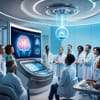Artificial intelligence (AI) is revolutionizing the healthcare industry, particularly in medical diagnosis and treatment. AI's ability to analyze vast amounts of data, identify patterns, and make predictions is transforming the way doctors diagnose and treat patients. From medical imaging to personalized medicine, AI is enhancing patient care and improving health outcomes.
One of the most significant applications of AI in healthcare is medical imaging. AI algorithms can analyze images from X-rays, CT scans, and MRIs to detect abnormalities and diagnose conditions more accurately and quickly than human doctors. For instance, AI-powered computer vision can help doctors detect breast cancer from mammography images, reducing the risk of false positives and false negatives.
AI is also being used to develop personalized treatment plans for patients. By analyzing a patient's genetic profile, medical history, and lifestyle, AI can predict the most effective treatment options and potential side effects. This approach enables doctors to tailor treatments to individual patients, leading to better health outcomes and reduced healthcare costs.
Furthermore, AI-powered chatbots and virtual assistants are being used to improve patient engagement and education. These AI-powered tools can provide patients with personalized health advice, medication reminders, and appointment scheduling, empowering them to take a more active role in their healthcare.
The integration of AI in healthcare is not without challenges, however. Ensuring the accuracy and reliability of AI algorithms, addressing data privacy concerns, and mitigating potential biases are essential to realizing the full benefits of AI in medical diagnosis and treatment.
As AI continues to evolve and improve, it is likely to play an increasingly important role in shaping the future of healthcare. By leveraging AI's capabilities, doctors and researchers can develop more effective treatments, improve patient outcomes, and enhance the overall quality of care.


